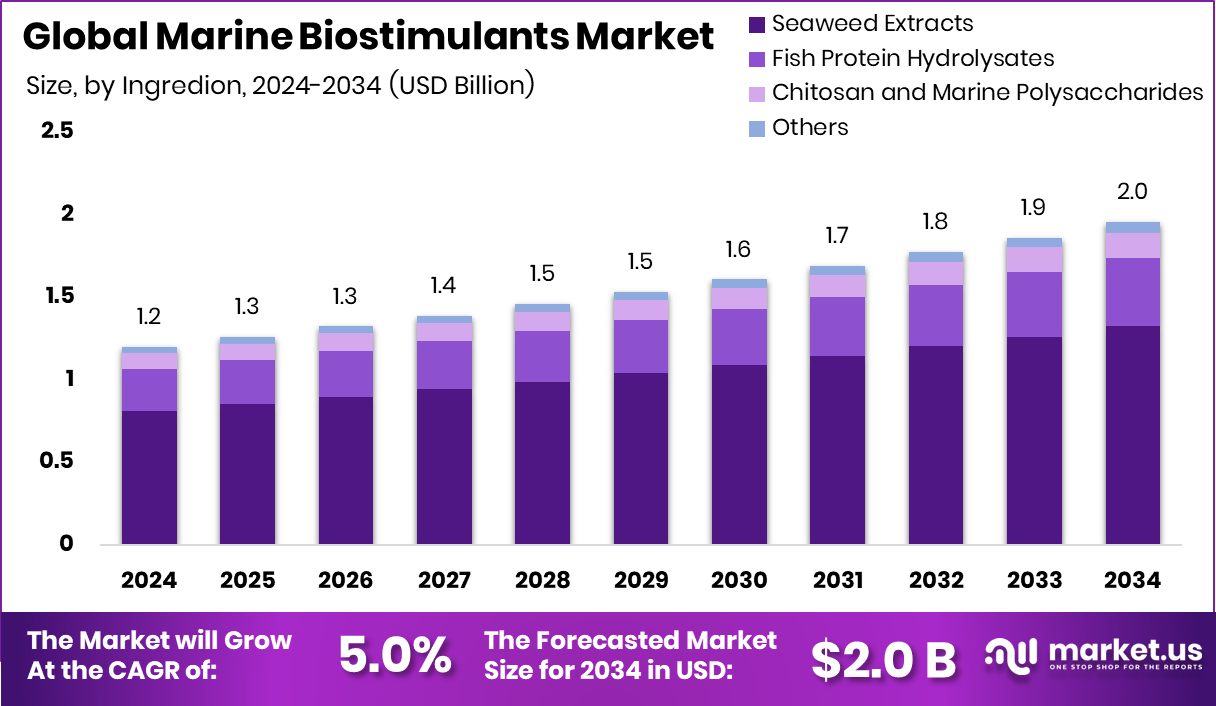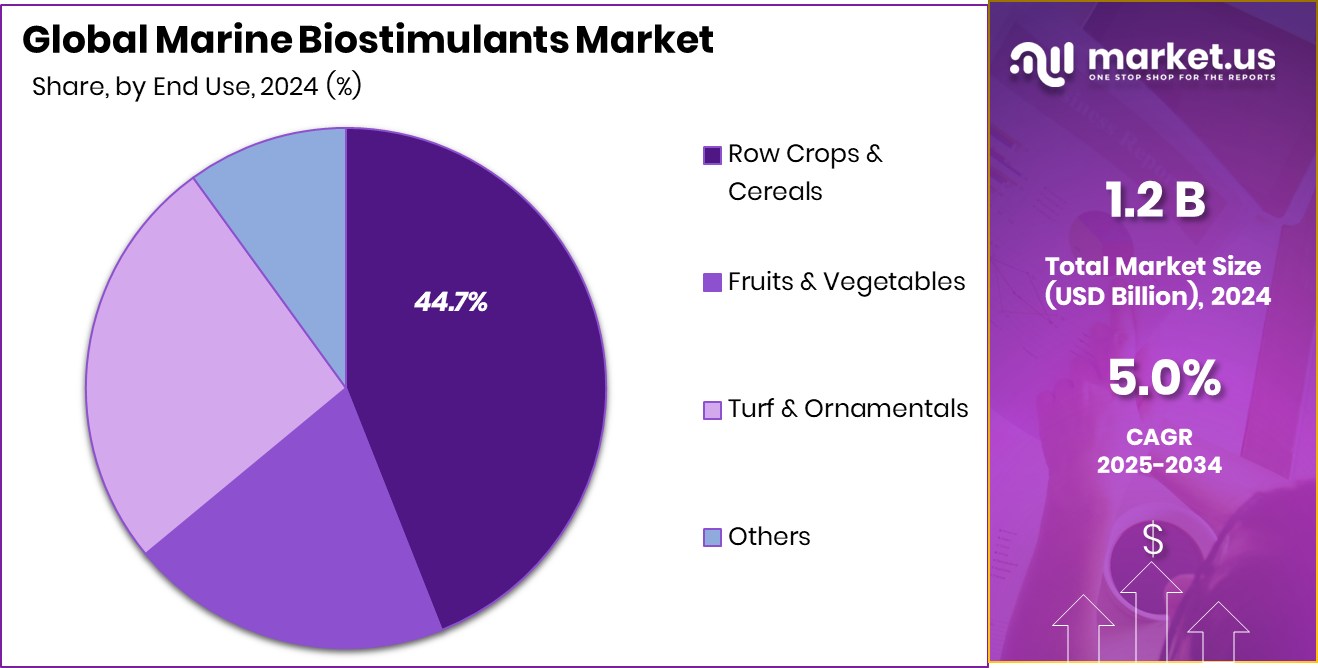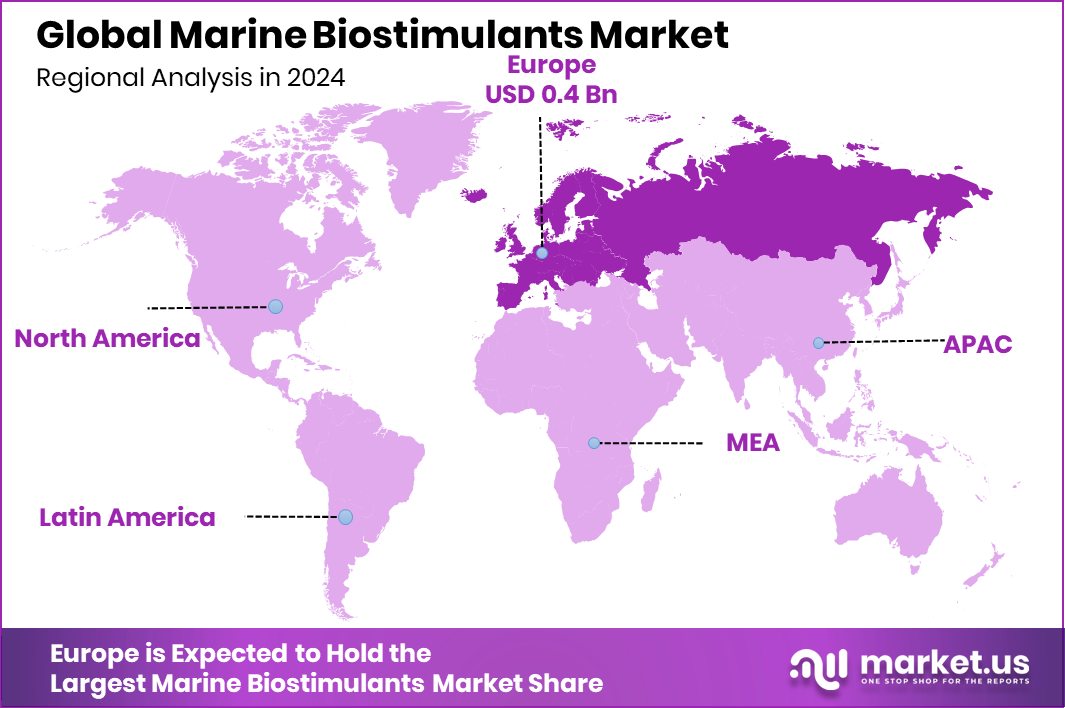Global Marine Biostimulants Market Size, Share, And Business Benefits By Ingredion (Seaweed Extracts, Fish Protein Hydrolysates, Chitosan and Marine Polysaccharides, Others), By Mode of Application (Foliar Treatment, Soil Treatment, Seed Treatment, Others), By End Use (Row Crops and Cereals, Fruits and Vegetables, Turf and Ornamentals, Others), By Region and Companies - Industry Segment Outlook, Market Assessment, Competition Scenario, Trends, and Forecast 2025-2034
- Published date: August 2025
- Report ID: 155728
- Number of Pages: 217
- Format:
-
keyboard_arrow_up
Quick Navigation
Report Overview
The Global Marine Biostimulants Market is expected to be worth around USD 2.0 billion by 2034, up from USD 1.2 billion in 2024, and is projected to grow at a CAGR of 5.0% from 2025 to 2034. Sustainable farming practices boosted Europe’s 41.40% share, USD 0.4 Bn.
Marine biostimulants are natural products derived mainly from seaweed extracts, algae, fish proteins, and other marine resources that enhance plant growth, nutrient absorption, and stress tolerance. Unlike fertilizers, they do not directly supply nutrients but stimulate the plant’s physiological processes, helping crops perform better under environmental stress such as drought, salinity, or poor soil health.
They are gaining attention in modern agriculture as sustainable and eco-friendly solutions for boosting productivity. Recently, Loam Bio secured $73m in Series B funding from Lowercarbon, Acre, and others to advance soil carbon solutions, highlighting the strong investor focus on biological and sustainable farming practices.

The marine biostimulants market refers to the global industry that produces and supplies these sea-derived growth enhancers for agriculture. This market is expanding rapidly as farmers and agribusinesses shift toward sustainable farming practices. Growing restrictions on chemical fertilizers and pesticides, coupled with rising demand for organic food, are pushing the adoption of marine biostimulants worldwide. In line with this shift, Citizens of Soil, a mission-driven olive oil venture, raised €2.1m to expand its impact in promoting soil-friendly and sustainable cultivation.
One of the main growth factors is the increasing global pressure to reduce the use of chemical fertilizers. Governments are encouraging eco-friendly farming solutions, and marine biostimulants fit perfectly in this shift. Their proven benefits in improving soil health and crop yields are driving their acceptance in both developed and emerging economies. Supporting this, Biome Makers, a soil biology innovator, obtained $15m in Series B financing to scale its work in soil microbiome technologies.
Demand is rising because of the growing preference for organic and residue-free crops. Consumers are becoming more aware of food safety and sustainability, which pushes farmers to adopt natural alternatives. Marine biostimulants also help crops withstand climate change-related stress, making them valuable in regions facing water scarcity or soil degradation. Reinforcing this trend, an Imperial startup gathered £5.3m to explore soil microbial potential, adding to the momentum of innovations around sustainable soil and crop management.
Key Takeaways
- The Global Marine Biostimulants Market is expected to be worth around USD 2.0 billion by 2034, up from USD 1.2 billion in 2024, and is projected to grow at a CAGR of 5.0% from 2025 to 2034.
- In the Marine Biostimulants Market, seaweed extracts accounted for a 67.8% share, highlighting their dominant role.
- Foliar treatment led the Marine Biostimulants Market with 57.9% share, proving its efficiency in crop nourishment.
- Row crops and cereals captured a 44.7% share in the Marine Biostimulants Market, emphasizing widespread agricultural adoption.
- European Marine Biostimulants Market is valued strongly at USD 0.4 Bn.
By Ingredion Analysis
The marine biostimulants market, by seaweed extracts, captures a 67.8% share.
In 2024, Seaweed Extracts held a dominant market position in the By Ingredient segment of the Marine Biostimulants Market, with a 67.8% share. This leadership is driven by the extensive use of seaweed-based formulations in agriculture due to their high content of natural bioactive compounds such as polysaccharides, amino acids, and growth hormones that stimulate plant metabolism.
Farmers across major agricultural regions are increasingly adopting seaweed extracts because they enhance nutrient uptake, improve root development, and boost crop resilience against stress factors like drought, salinity, and extreme temperatures. The rising demand for sustainable and organic farming inputs has further strengthened the dominance of seaweed extracts, as they are derived from renewable marine resources and align with eco-friendly cultivation practices.
Moreover, their versatility across a wide range of crops—including cereals, fruits, vegetables, and ornamentals—has expanded their usage globally. Seaweed extracts are also widely recognized for improving soil structure and microbial activity, which enhances long-term productivity.
In 2025, this segment is expected to maintain its strong market hold as advancements in extraction technologies and increasing government support for organic agriculture continue to drive growth. The 67.8% share highlights the clear preference for seaweed extracts as the cornerstone ingredient in marine biostimulant applications.
By Mode of Application Analysis
Foliar treatment dominates the marine biostimulants market with a 57.9% share.
In 2024, Foliar Treatment held a dominant market position in the By Mode of Application segment of the Marine Biostimulants Market, with a 57.9% share. This dominance is mainly due to the direct and efficient nutrient absorption offered by foliar spraying, where marine biostimulants are applied directly to plant leaves.
The method allows crops to quickly utilize bioactive compounds such as seaweed-derived polysaccharides, amino acids, and growth-promoting hormones, leading to faster physiological responses and visible improvements in crop health. Farmers prefer foliar treatment because it not only boosts photosynthesis and enhances chlorophyll production but also helps plants recover rapidly from environmental stresses like drought, salinity, and pest pressure.
The popularity of foliar application is also linked to its cost-effectiveness, as smaller doses can provide significant results compared to soil-based treatments. Its flexibility across a wide range of crops, including fruits, vegetables, and field crops, has further increased adoption.
In 2025, the share of foliar treatment is projected to remain strong, supported by technological improvements in spraying equipment and increasing awareness of sustainable farming practices. The 57.9% share reflects its position as the most trusted and widely used method for delivering marine biostimulants effectively and efficiently in modern agriculture.
By End Use Analysis
Row crops and cereals hold 44.7% of the marine biostimulants.
In 2024, Row Crops and Cereals held a dominant market position in the by-end-use segment of the Marine Biostimulants Market, with a 44.7% share. This dominance comes from the extensive cultivation area and global demand for staple crops such as wheat, maize, rice, and barley, which form the backbone of food security worldwide.
Farmers are increasingly using marine biostimulants on these crops to improve nutrient efficiency, strengthen root systems, and enhance resilience against abiotic stresses like drought, salinity, and temperature fluctuations. The use of marine-derived inputs such as seaweed extracts has shown positive effects on crop yields and grain quality, making them highly attractive for large-scale cereal production.
The segment’s leadership is also supported by the growing pressure on agriculture to produce more from limited arable land while reducing reliance on chemical fertilizers. Marine biostimulants applied to row crops not only improve productivity but also help maintain soil health, which is critical for long-term sustainability.
In 2025, this 44.7% share is expected to remain stable as governments and farming communities promote eco-friendly cultivation practices. The dominance of row crops and cereals highlights the critical role of marine biostimulants in meeting global food demand while ensuring sustainable agricultural development.

Key Market Segments
By Ingredion
- Seaweed Extracts
- Fish Protein Hydrolysates
- Chitosan and Marine Polysaccharides
- Others
By Mode of Application
- Foliar Treatment
- Soil Treatment
- Seed Treatment
- Others
By End Use
- Row Crops and Cereals
- Fruits and Vegetables
- Turf and Ornamentals
- Others
Driving Factors
Rising Demand for Sustainable and Organic Farming
One of the biggest driving factors for the marine biostimulants market is the growing demand for sustainable and organic farming practices. Farmers and food producers across the world are moving away from heavy use of chemical fertilizers and pesticides because of their harmful effects on soil, water, and human health. Marine biostimulants, made from seaweed, algae, and other natural marine resources, are seen as safe and eco-friendly solutions.
They help plants grow better, improve soil fertility, and increase crop tolerance to climate stress. With consumers showing a strong preference for organic and chemical-free food, the use of marine biostimulants is expanding quickly. Supportive government policies and organic certification standards are further boosting their adoption in agriculture.
Restraining Factors
High Production Costs Limit Wider Market Adoption
A major restraining factor for the marine biostimulants market is the high cost of production and processing. Extracting useful compounds from seaweed, algae, or marine sources requires advanced technology, skilled labor, and quality control, which makes the final product more expensive than traditional fertilizers or growth enhancers.
Many small and medium farmers, especially in developing regions, find it difficult to afford these products even though they are effective and eco-friendly. This limits large-scale adoption, as price plays a big role in farmers’ decisions. Until production technologies become more efficient and costs go down, the higher price of marine biostimulants will remain a challenge, slowing their wider acceptance despite their proven agricultural benefits.
Growth Opportunity
Expanding Use in High-Value Horticultural Crops
One of the biggest growth opportunities for the marine biostimulants market lies in their expanding use in high-value horticultural crops such as fruits, vegetables, vineyards, and ornamentals. These crops are more sensitive to stress and require better nutrient management to maintain quality, taste, and shelf life. Marine biostimulants help improve fruit size, color, and overall yield while also reducing post-harvest losses, which is highly important for export markets.
As consumer demand for fresh, chemical-free produce rises, farmers are willing to invest in advanced solutions that provide better returns. The premium value of horticultural crops makes the adoption of marine biostimulants economically feasible, opening up strong opportunities for growth in both developed and emerging agricultural markets.
Latest Trends
Integration of Biostimulants with Precision Farming Practices
A key latest trend in the marine biostimulants market is their integration with precision farming and smart agriculture practices. Farmers are increasingly using advanced tools like drones, sensors, and automated spraying systems to apply marine biostimulants more efficiently and in the right amounts. This approach not only saves costs but also ensures crops receive the exact dose needed to improve growth and stress tolerance.
Precision farming also helps track crop response in real time, allowing adjustments for maximum productivity. Combining marine biostimulants with modern technology supports sustainable agriculture while improving yield and quality. This trend is gaining momentum worldwide as farmers seek smarter, eco-friendly solutions that balance profitability with environmental responsibility.
Regional Analysis
In 2024, Europe led the Marine Biostimulants Market, with 41.40%.
The Marine Biostimulants Market shows strong regional dynamics, with Europe emerging as the dominant region in 2024, holding a 41.40% share valued at USD 0.4 billion. This leadership is driven by the region’s well-established organic farming practices, strict environmental regulations, and strong consumer demand for chemical-free agricultural produce. European farmers are highly receptive to sustainable solutions, and government policies supporting eco-friendly cultivation have further accelerated adoption.
Countries such as France, Spain, Italy, and Germany are leading contributors, with extensive use of seaweed-based biostimulants across row crops, fruits, and vegetables. The presence of advanced agricultural infrastructure and high awareness among farmers has strengthened Europe’s dominance compared to other regions. While North America, Asia Pacific, the Middle East & Africa, and Latin America are also expanding steadily, their market share remains comparatively lower as adoption is still developing in certain areas.
However, Europe’s 41.40% share highlights its role as the frontrunner, setting benchmarks in innovation, sustainability, and large-scale use of marine biostimulants. With continued emphasis on reducing chemical inputs and meeting organic certification standards, Europe is expected to maintain its leading position in the coming years, making it the most influential regional market for marine biostimulants.

Key Regions and Countries
- North America
- US
- Canada
- Europe
- Germany
- France
- The UK
- Spain
- Italy
- Rest of Europe
- Asia Pacific
- China
- Japan
- South Korea
- India
- Australia
- Rest of APAC
- Latin America
- Brazil
- Mexico
- Rest of Latin America
- Middle East & Africa
- GCC
- South Africa
- Rest of MEA
Key Players Analysis
Acadian Plant Health focused heavily on advancing seaweed-based technologies, using its expertise in marine resource management to deliver biostimulants that improve crop resilience and yield. The company’s strategy revolves around expanding research in stress tolerance and soil health, aligning with the rising demand for climate-smart agriculture.
Similarly, ASL (Acadian Seaplants Limited), with its vertically integrated operations from seaweed harvesting to product formulation, continues to strengthen its leadership by ensuring supply chain reliability and premium product quality, which has helped it build long-term partnerships in global agriculture.
BASF SE, a global chemical giant, has strategically expanded its biologicals portfolio, positioning marine biostimulants as part of its broader sustainable agriculture solutions. With strong R&D capacity and distribution networks, BASF is channeling resources into combining biostimulants with digital and precision farming tools, enabling efficient usage and improved farmer returns.
Meanwhile, UPL has been actively expanding its biosolutions category, integrating marine-derived products into its portfolio to support global food security and sustainable farming. UPL’s strong presence in emerging markets gives it an advantage in scaling marine biostimulant adoption, particularly in regions transitioning from traditional to sustainable agriculture practices.
Top Key Players in the Market
- Acadian Plant Health
- ASL (Acadian Seaplants Limited)
- BASF SE
- UPL
- BioAtlantis Ltd.
- Qingdao Blue Treasure Seaweed Biotech. Co., Ltd
- Qingdao Seawin Biotech Group Co., Ltd.
- ClimaCrew Pvt Ltd
- Futureco Bioscience
- Brandt, Inc.
- Corteva
Recent Developments
- In May 2024, BASF Agricultural Solutions teamed up with Anhui Huaheng Biotechnology in China to jointly develop biostimulant products. They also set up a shared R&D institute to help with product formulation, field trials, and research into how these biostimulants work. The aim is to increase crop yield, quality, and resilience while promoting digital farming techniques.
- In April 2024, Acadian Plant Health formed a new distribution partnership with Koppert USA. As of April 1, Koppert began distributing Acadian’s marine biostimulants to retail customers across multiple U.S. states, including California, Texas, Florida, and others. This move helps farmers access Acadian’s products more quickly and benefit from better technical support.
Report Scope
Report Features Description Market Value (2024) USD 1.2 Billion Forecast Revenue (2034) USD 2.0 Billion CAGR (2025-2034) 5.0% Base Year for Estimation 2024 Historic Period 2020-2023 Forecast Period 2025-2034 Report Coverage Revenue Forecast, Market Dynamics, Competitive Landscape, Recent Developments Segments Covered By Ingredion (Seaweed Extracts, Fish Protein Hydrolysates, Chitosan and Marine Polysaccharides, Others), By Mode of Application (Foliar Treatment, Soil Treatment, Seed Treatment, Others), By End Use (Row Crops and Cereals, Fruits and Vegetables, Turf and Ornamentals, Others) Regional Analysis North America – US, Canada; Europe – Germany, France, The UK, Spain, Italy, Rest of Europe; Asia Pacific – China, Japan, South Korea, India, Australia, Singapore, Rest of APAC; Latin America – Brazil, Mexico, Rest of Latin America; Middle East & Africa – GCC, South Africa, Rest of MEA Competitive Landscape Acadian Plant Health, ASL (Acadian Seaplants Limited), BASF SE, UPL, BioAtlantis Ltd., Qingdao Blue Treasure Seaweed Biotech. Co., Ltd, Qingdao Seawin Biotech Group Co., Ltd., ClimaCrew Pvt Ltd, Futureco Bioscience, Brandt, Inc., Corteva Customization Scope Customization for segments, region/country-level will be provided. Moreover, additional customization can be done based on the requirements. Purchase Options We have three licenses to opt for: Single User License, Multi-User License (Up to 5 Users), Corporate Use License (Unlimited User and Printable PDF)  Marine Biostimulants MarketPublished date: August 2025add_shopping_cartBuy Now get_appDownload Sample
Marine Biostimulants MarketPublished date: August 2025add_shopping_cartBuy Now get_appDownload Sample -
-
- Acadian Plant Health
- ASL (Acadian Seaplants Limited)
- BASF SE
- UPL
- BioAtlantis Ltd.
- Qingdao Blue Treasure Seaweed Biotech. Co., Ltd
- Qingdao Seawin Biotech Group Co., Ltd.
- ClimaCrew Pvt Ltd
- Futureco Bioscience
- Brandt, Inc.
- Corteva










